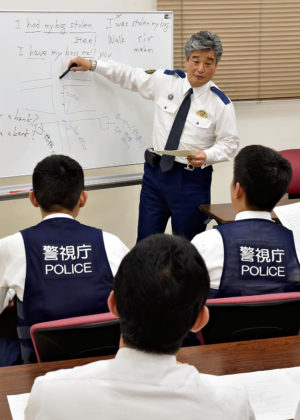
TOKYO — As the 2020 Tokyo Olympics and Paralympics approach, the Metropolitan Police Department is working hard to polish the foreign language skills of its officers.
The MPD’s aim is to ensure quicker responses when foreign tourists are in trouble — such as losing their belongings or being involved in accidents or crimes. It also plans to install translation software that can handle 30 languages in officers’ smartphones next spring, as part of efforts to welcome foreign visitors for the Tokyo Games.
“Down the street. Turn to the left, at the next intersection,” an officer said during a lesson at the Itabashi Police Station. An English class is held once a week at the station for officers who have finished their work, teaching such material as how to give visitors directions.
Shigetaka Kai, deputy chief of the station, is the lecturer. “It’s important to use gestures and speak earnestly. I hope that the officers will respond warmly [to foreign visitors] so that they’ll like Japan,” said Kai, 55, who was once assigned to the Tokyo bureau of Interpol.
English classes for police officers were also held 54 years ago for the 1964 Tokyo Games. Footage exists of officers learning English conversation — there were few then with good command of English, so officers started with basic conversations.
During the 1964 Games, there were reports of 17 thefts targeting foreign nationals, and officers who studied English were dispatched to handle such cases. Hisaaki Motooka provided Olympic security then as a member of the first unit of the MPD riot squad. “I underwent intensive English training for about a month,” the 88-year-old said.
“Things are different now from my time, but I believe the [police members’] passion toward sharing a historical moment won’t be different,” Motooka said.
The number of foreign visitors to Japan has steadily increased in recent years, reaching 28.69 million last year. The government has set a goal of increasing the number to 40 million in 2020, the year the Olympics take place. As the figures are rising, the number of foreign visitors involved in accidents or crimes is expected to exceed the 1964 level.
At the MPD Police Academy — rookies spend about six to 10 months there — about 10 minutes of practical conversation, such as asking people to show their passports, is broadcast in English, Chinese and Korean for 10 minutes before bedtime.
The aim of the program is to help police officers, who are expected to engage in on-the-spot duties during the 2020 Games, to acquire basic conversation skills. For officers who provide interpretation, the MPD has instructed them to study at language schools to further polish their skills, such as pronunciation.
English guidance has already been introduced in the MPD’s efforts to maintain order in crowded public areas. In February 2017, the police selected riot squad members fluent in English to form an English-speaking version of “DJ Cops,” a nickname for police officers who use friendly, witty announcements to manage crowds during big events. The selected members use their English skills to manage the crowds at such events as the Tokyo Marathon and fireworks displays. Their fluent English and guidance has drawn positive feedback.
The MPD has distributed 5,000 special smartphones mainly to officers who work at police boxes. The MPD plans to install automatic translation software that can produce audio in 10 languages including English and Chinese next spring. The software can also make text translations in 20 languages such as Arabic and Hindi.
Road signs with English words are now being installed at about 1.7 million locations nationwide, replacing old signs. In Tokyo, signs that explain how to use the push-button traffic lights for pedestrians have been installed in multiple languages. The MPD has also produced, and is distributing, brochures explaining Japan’s road signals and traffic rules.

